'I had to convince myself that I was steely enough to operate on a cold-blooded killer.'
'For all my medical experience, this was something I had never done!'
'If something happened to Charles, I knew my fate was sealed for me.'
'I would be called Doctor Death until I breathed my last.'
'Success was my only hope of escaping that fate.'
A fascinating excerpt from heart surgeon Dr Raamesh Koirala's Charles Sobhraj, Inside The Heart Of The Bikini Killer.
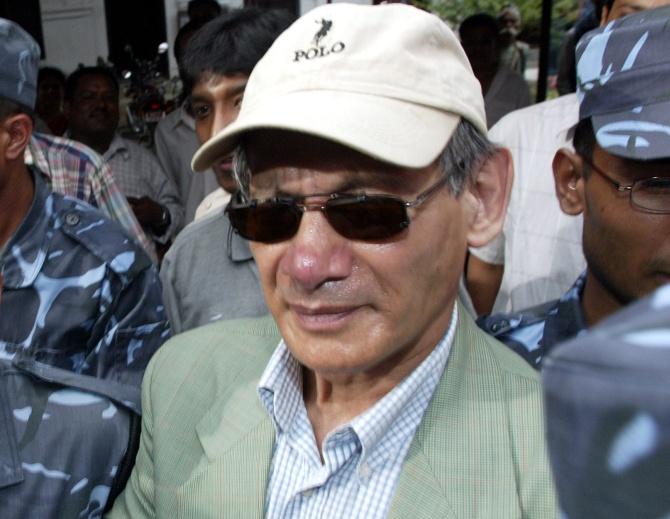
'Sir, I will make the skin incision.'
'And I will cut his sternum.'
The two young doctors -- Subita and Ansu -- rattled off their wish-list in a single breath. It seemed like a pledge. Or a demand. I cannot say what exactly it was.
I was used to seeing these young doctors giggling and gossiping every day, always as cheerful and excitable as schoolgirls.
Their conversations usually seemed merry, far away from thoughts of dusty Kathmandu or its political system.
Neither of them had even bothered to register their names in the voter list for the recent local election
And yet, all of a sudden, they were making demands like these. No giggles. No smiles. Just a final, unchangeable decision.
They looked at me with solemn faces, determination writ large in their eyes. After a moment's consideration, I nodded, and pretended to get back to my papers.
From the corner of my eyes, I could see their excitement -- the excitement to cut open Charles Sobhraj's chest.
Subita and Ansu had been working at the hospital for a year. They had made up their minds to resign before something happened to change the course of their lives.
It wasn't unusual in the medical community for young doctors to take time off for postgraduate entrance examinations.
But both of them had postponed their plans for one reason -- to witness the surgery that would fix Charles Sobhraj's heart
Now, not only were they getting a chance to witness the surgery but they would be an integral part of it. They would see his heart beating, almost human and yet not quite.
I was beginning to understand their excitement.
****
'Hey! Did you know I am repairing Charles Sobhraj's valves?' I was back home and called out to Poonam, my wife. She was in the kitchen, marinating a chicken for dinner
Poonam is a doctor herself and is always very interested to hear about the cases I pursue. But today, she did not answer.
Perhaps she hadn't heard me.
'I am fixing Charles Sobhraj's heart,' I repeated.
She turned around to look at me. There was no excitement on her face, no happiness for the challenging case her husband had been entrusted with. It was most unusual.
Okay,' she said.
It dawned upon me at that moment -- the reason for her cold, almost scared, response.
Poonam's father had been a junior police officer at Tihar Jail in India, the jail from where Charles Sobhraj had escaped several years ago.
Although Poonam had then been a little girl, she had watched her father fret every night, consumed by anxiety and unable to sleep.
And now her husband was talking about the same notorious man -- Charles Sobhraj.
My wife spent the next couple of hours locked up in her room. From the sound coming through the door, I could guess what she was up to.
She was watching YouTube documentaries on Charles. She wanted to find out all she could about the con man, the cold-blooded murderer who had brought untold trauma to her father and had now sprung up in her husband's life.
During dinner that night, I tried to read her emotions. It was a quiet and tense meal; Poonam's mobile phone was lying next to her plate, overheated from streaming one video after another.
I could still see a film by National Geographic on the screen, paused midway.
My wife met my eyes, voicing a question I had no idea how to answer.
'Does he even have a heart?'
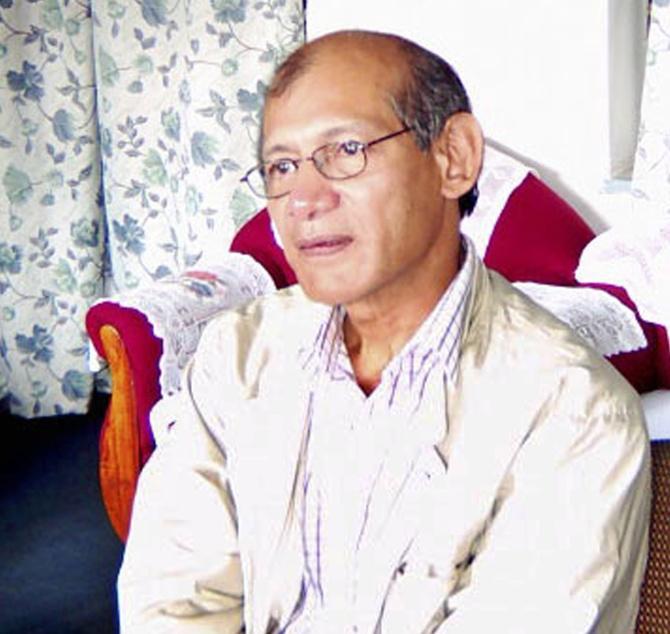
Sobhraj, a French citizen, was released from jail in 1997 after a 20-year jail sentence for a string of charges, including murder and robbery, often involving tourists. Photograph: Reuters
In the coming week, the ICC Cricket Championship was set to start. I was eagerly waiting for it.
I was rooting for India to win, primarily because of Mahendra Singh Dhoni. I will admit, I am quite an M S Dhoni fanboy, and became a fan of the Indian cricket team mainly because of him.
The recent news about Dhoni giving up his captaincy had dismayed me, but even so, it was thrilling to see him sail through as a batsman, scoring a thousand, 5,000, and then, 10,000 ODI runs!
I was thinking about him as I finished my routine duties at the hospital.
It was Wednesday -- my outpatient clinic day. I completed my rounds of the ICU and the wards by 11:30 am and headed towards the OPD -- room number 16.
I switched on the light in the corridor. In the waiting area, patients sat waiting for me, chatting with their friends and relatives.
Some of them called out to me in greeting. I smiled at them and opened the door to my room.
And I saw him. Mr Hatchand Bhaonani Gurumukh Charles Sobhraj. The infamous con man, the serpentine murderer, now in his early seventies.
He sat there inside my cabin, handcuffed, and surrounded by four policemen.
I sat down on my chair and switched on the patient-call machine. Charles Sobhraj hurried towards me almost as soon as I had pressed 1, 2 and 3.
'Hey, doctor! Can you help me?'
'Hello,' I said, quickly looking at one of the policemen. I was distinctly uneasy, seeing four burly, uniformed men in my clinic, all guarding my patient as if he could dash off any minute.
'Please sit down,' I pointed to the stool opposite my chair.
'Can you fix a meeting with my doctor? I think I need heart surgery.'
I tried to look nonchalant. I did not particularly want to divulge that I knew all about his ailment.
Navin and I had discussed at length the specific type of surgery that Charles needed.
It had been all we had talked about ever since we first got the news. Moreover, I could guess where this conversation was headed.
'I think Dr Navin was supposed to operate on you. What happened?'
I wanted to play a purely defensive game, just like Rahul Dravid batting in front of the wickets, extremely conscious of Shane Warne's bowling.
'Not him. Can you fix a meeting with my doctor?'
'Who is your doctor?' I persisted.
As an MS Dhoni fan, I was ready for the helicopter shot, if only I was offered a relatively loose ball.
'I heard that my doctor is climbing the mountains.'
Mountains? Really? Even though I had once gone to the Annapurna base camp and had recently returned from a subalpine meadow, I was no mountaineer. 'Who?'
'They told me Dr Koirala had taken an off for climbing.'
Ah, there were two Dr Koiralas in the hospital. I jumped at the chance to hit his off-stump yorker. 'Which Koirala?'
'No, no, not that one.' For someone new to the hospital, he seemed uncannily aware of all its doctors. 'I want Dr Ramis Koirala from Gangalal.'
Oh, god.
'I'm Raamesh Koirala. Is it me you are looking for?'
His facial expression changed; his jaw dropped visibly. He probably remembered me from one of his old visits.
There was that time when he had even allowed me to click a picture. He had probably put me down as a member of the paparazzi.
For a few seconds, he didn't say a word. I enjoyed those seconds tremendously.
'Are you the Dr Ramis Koirala?'
It is Raamesh, I wanted to pinpoint again. I hated it when people mispronounced my name.
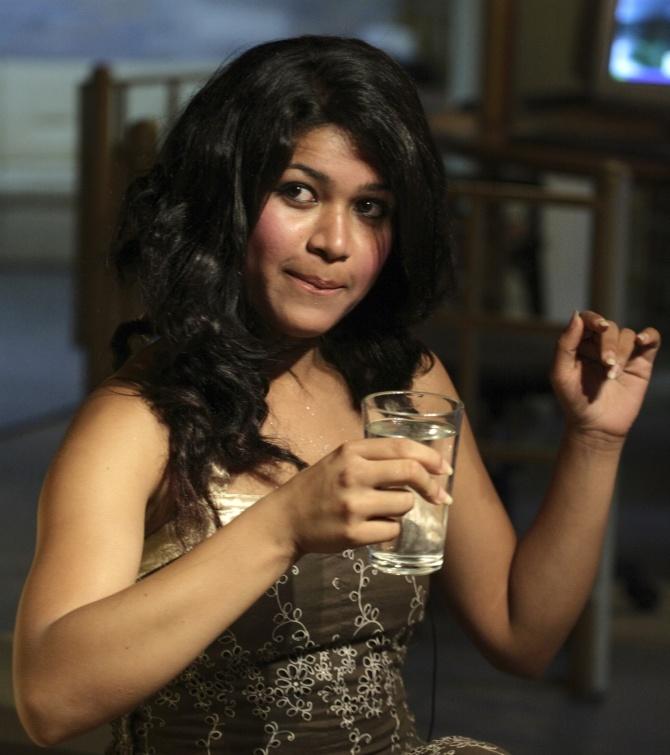
'Doctor saab, he wants you to correct him the operation,' one of the policemen -- an assistant sub-inspector -- stepped forward. 'We had to take him back last week.'
Normally, I didn't take too long to decide the cases I wanted to handle. Previously too, I had been approached by friends and relatives of my ex-patients, people who selected surgeons based on recommendations, much like the movies they watched.
But this time, it wasn't that straightforward to say yes. I knew I had to review many aspects first.
Would I be able to reschedule my operating list? Or would I need to operate him on overtime? I needed to talk to Navin -- his surgeon-in-charge -- about this swapping.
I also had to check with the hospital administration on the procedural requirements of admitting a convict of such monstrous reputation from the central jail.
But most importantly, I had to convince myself that I was steely enough to operate on a cold-blooded killer. For all my medical experience, this was something I had never done!
I found myself unable to decide. As a doctor, it was my moral -- and professional -- responsibility to attend to my patients, even if their occupation was murdering people.
But that morning, reluctance prevailed. I looked at my medical officer, Sabita. Her face was blank.
'Let's meet another day.'
Doctors are said to be bound by the Hippocratic oath that prohibits them from refusing medical treatment to anyone, on any basis.
Being the best student of my batch in medical school, I had enjoyed the rare luxury of standing next to the dean and leading the oath-taking ceremony.
But neither the original text in Latin nor its Ukrainian translation at the L'viv Medical Institute had anything about not being allowed to refuse treatment.
The fourth point of the Code of Conduct of the Nepal Medical Council did have something to that effect, but I found it incomplete:
Will not allow consideration of age, sex, religion, nationality, ethnicity, politics, or social standing to intervene between my duty and my patient.
So? I wasn't! He wasn't my patient at all, and government hospitals have a rule against the swapping of doctors without mutual consent.
I could just tell Charles Sobhraj that I was following the norms of the medical practice
Poonam was very decisive.
'No. You will not do it. Just tell them so outright.'
While I understood her sentiments, I could not share them fully.
One night, I heard her talking on the phone with her father. 'Why is this happening to me?' she said. 'Why is that sick man a part of my life in two different countries, involved with the only two men I love? Is destiny giving me an ominous sign?'
I was sitting on the balcony, sipping tea and brooding over my wife's worries, when Madan, Charles's doctor-in-charge at the central jail, called.
'Raamesh, please take over the case of Sobhraj.' No small talk, no background. Here was a senior doctor issuing an order to me, all under the guise of 'please'.
I was glad I was finally speaking to a doctor in the know-how of things, someone well-versed with Charles's case.
Surely, he could tell me why it was so important that I perform the surgery, even when Navin -- the designated surgeon -- was fully capable.
'Why must it be me?'
'His plea created a huge drama. That's why we want you to operate.' He paused.
I got the feeling that if it hadn't been for the plea and the international media coverage that followed, Charles would have probably been operated upon while I was in Khaptad.
'Dai, I don't understand. He is imprisoned for life, isn't he?'
'Yes.'
'Is there any harm to you, Nepal, or even the mankind if he dies?'
'No.'
'Will you get a promotion if he gets cured?'
'No.'
'Will you face any inquiry if he dies during or after the surgery?'
'No.'
'But he is still important for us?'
'Yes.'
'Then why am I being involved?' I was getting tired of his monosyllabic yes or no answers.
He spoke after a moment or two. 'I am pretty sure Charles Sobhraj will pass his last days in the Golghar. But we cannot afford his death during heart surgery.'
'Why not?'
'Don't be naive. It would lead to so much international defamation you cannot even imagine!'
'So, you'd rather put my reputation and entire career at risk than risk the life of a convict slated to die one day in jail?'
'You are free to think that way, bhai. Anyway, you are not well known, are you?'
I abruptly disconnected the call. I didn't like the tone that doctor took with me -- I don't have false notions of being a world-famous doctor, but I was certainly not inferior to the murderer.
Madan's phone call ruined the rest of the evening for me. I tried to seek some consolation from the India-Pakistan cricket match for the ICC Champions Trophy.
But it did me no good. I kept waiting for Dhoni to bat, to inch towards 10,000 ODI runs, but his turn never came.
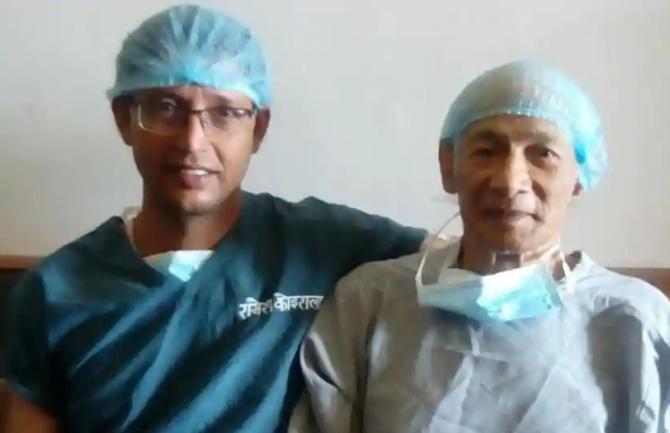
He came to my outpatient clinic first, for preliminary scans. I glanced at the policemen accompanying him, peering slyly through my spectacles, and wondered what weapons they possessed.
Charles looked frail and sick, seemingly having aged several years in a few weeks. If it had been anyone else, even the prospect of 'escape' would have been ludicrous. But this was Charles Sobhraj.
A few hours earlier, we had completed our preparations for his stay. It was a deluxe cabin, charged at 3,000 rupees a day.
We decided to keep his whereabouts a secret -- no patient's name on the whiteboard, simply to trick the media.
Five gunmen had been designated to guard him continuously. Ram had also requested to keep Sobhraj handcuffed throughout his time in the hospital.
'Do I have to pay?' Charles raised his eyebrows.
'Forget about the pay. Instead, pee.' His creatinine levels, a marker of kidney function, were unnaturally high and constantly rising.
A creatinine reading of 211 micrograms per litre was not good news for a patient about to undergo heart surgery.
I administered some diuretics and also added a dopamine infusion to his medicine chart.
The dopamine, a catecholamine, would help boost his heart's pumping capacity and assist it in delivering more blood to the kidneys.
I am a heart surgeon. I had taken on many challenging cases in the past -- cases that demanded swift decisions. 'A surgeon's hands must never shake; his mind must never double guess itself,' one of my professors in medical school would always say.
And yet, that day, decisions didn't come easily to me.
I knew the slightest error in judgement could set me up for a public trial. In a feudal society, a teenager could be beaten to death for the crime of -- or merely the suspicion of -- pickpocketing.
A girl could be beaten, fed human excreta, and tied to a tree for supposedly being a witch. When the public meted out justice, everyone was the police, the law, the judiciary -- all at once.
If something happened to Charles, I knew my fate was sealed for me. I would be called Doctor Death until I breathed my last. Success was my only hope of escaping that fate.
I spoke to Charles, 'Whenever you go to the toilet, measure the amount of urine and inform the nurse. Don't forget. I need to know that the drugs are working as they should.'
Charles turned out to be a model patient. By Sunday morning, his urine volume had reached seven litres.
The swelling in his leg had gone down considerably, and his breathing had also eased a little. The creatinine levels were down to 180 micrograms per litre.
If nothing else, it was a welcome sign that his kidneys could function well, if only the heart would allow it.
It made me feel a little better to note that the catecholamine was working; it had managed to power up his heart's contractions, leading to better blood flow to his vital organs, especially his kidneys.
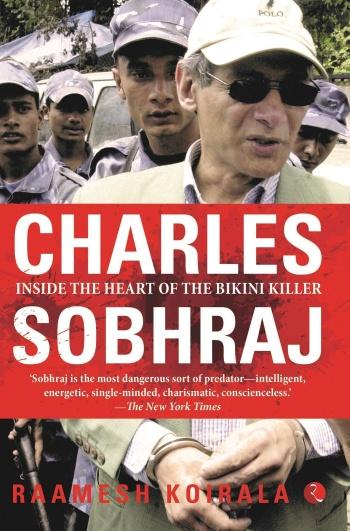
'I feel better, doctor.' Charles gave me a small, watery smile on Sunday afternoon while nibbling at a lychee.
Earlier that day, a representative from the French embassy had turned up with a basket of lychees and mangoes.
I couldn't imagine why the embassy held him in such high regard, calling every day to inquire about his well-being, sending people with baskets of fruit.
If only they gave half of this consideration to our campaign to free the pavement for pedestrians!
By Monday morning, Sobhraj's creatinine levels were down to 155 -- only a little higher than the average mark.
Another significant decision now faced me -- the specific type of surgery to perform on his heart valves.
I was desperate to conduct a successful operation, to see Charles emerge alive and healthy. There was no scope for error, human or otherwise.
'When do you plan to operate?' On the day of admission, Shakuntala Didi asked me.
'I am arranging for the blood donors as you asked.'
'Sometime next week,' I said vaguely. Mondays and Thursdays were my operation days, but I had yet to accept the finality of it all.
Excerpted from Charles Sobhraj, Inside The Heart Of The Bikini Killer by Raamesh Koirala, with the kind permission of the publishers, Rupa Publications.










